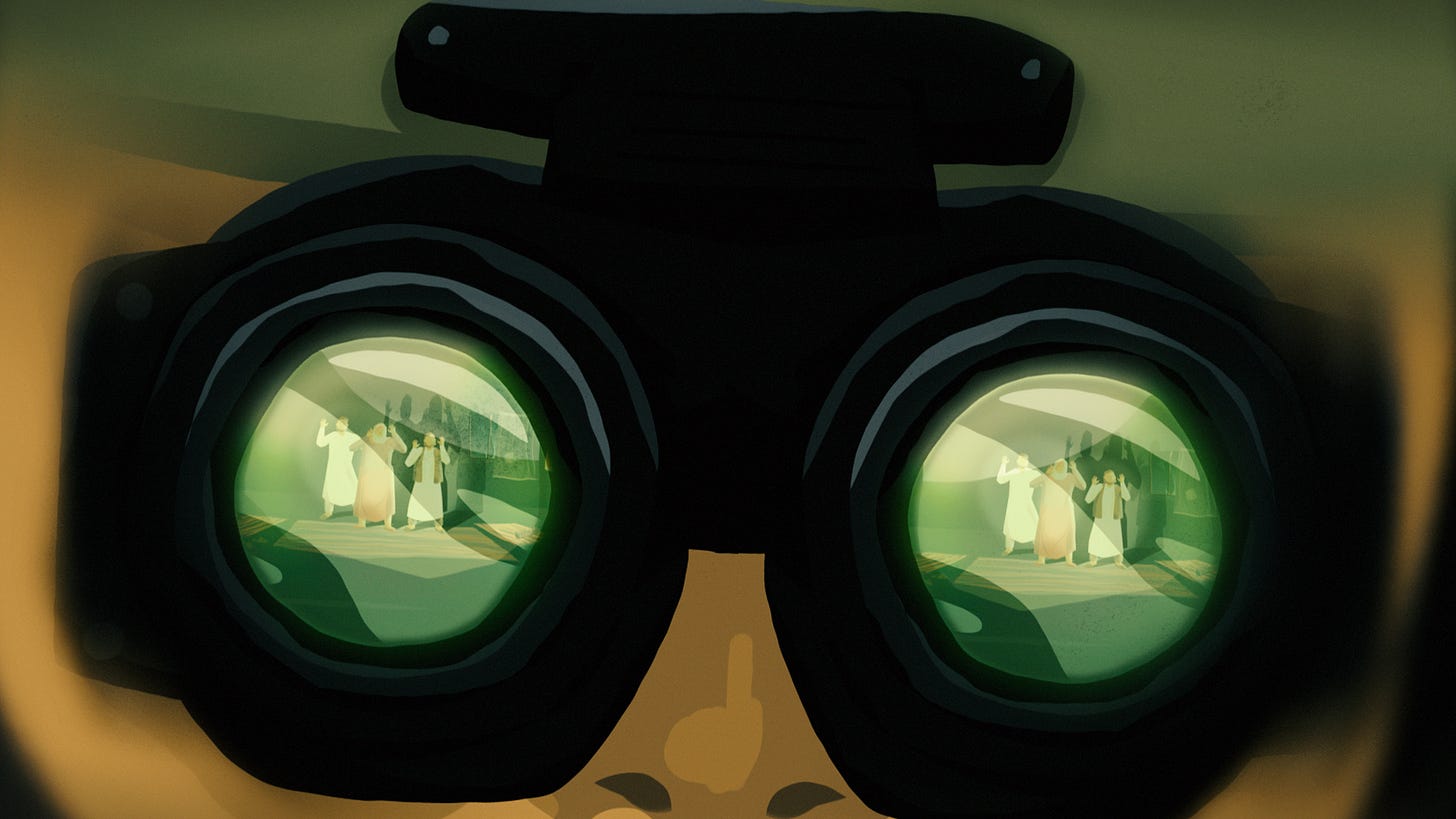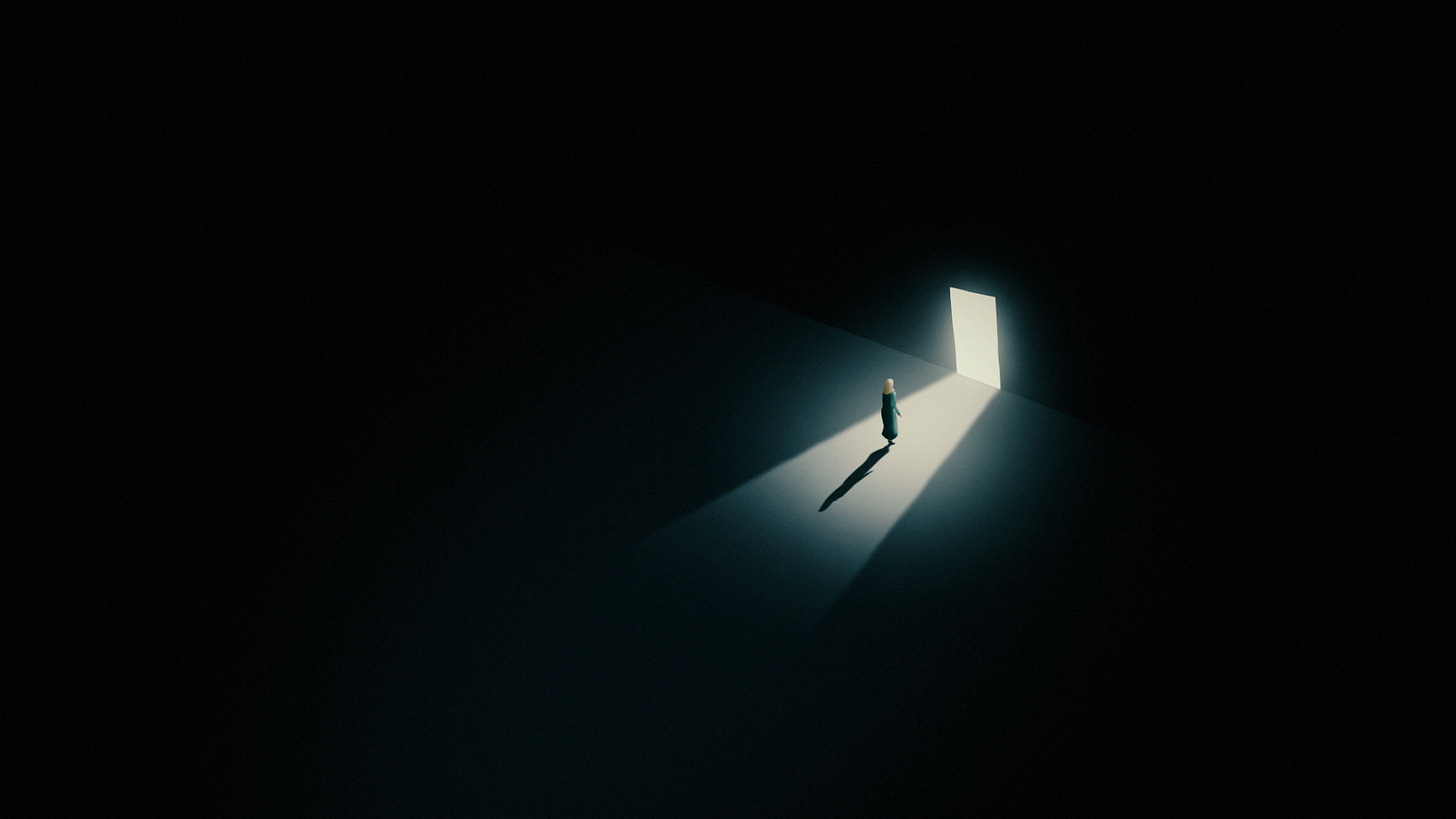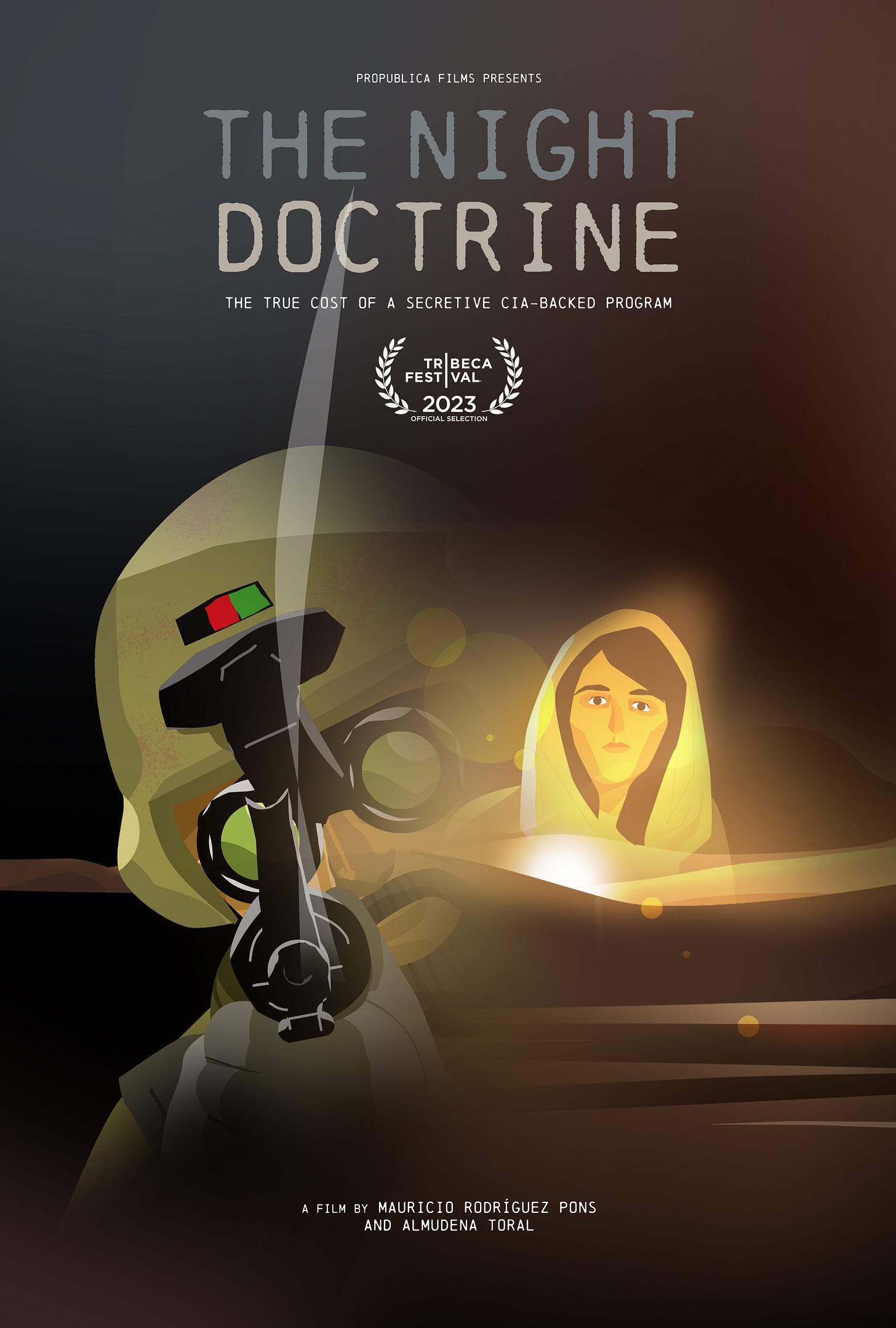In Conversation with... Lynzy Billing and Almudena Toral
"First and foremost, this was always a search for accountability."
The Night Doctrine is a compelling animated short film about the deeply troubling experiences of those involved in night raids in Afghanistan. Director Almudena Toral and Producer Lynzy Billing, a young Afghan-Pakistani journalist whose investigation into her family leads her to discover far more about a monstrous war tactic, talk to Miss En Scene about the approach to production and wider context for the film ahead of its premiere at Tribeca Film Festival.
Clare - Miss En Scene: I am deeply sorry to learn about what your biological family experienced. Has the process of producing the film been a cathartic experience for you or eased the grief at all?
Lynzy Billing: The investigation that this film is based on and producing the film itself brought up a lot of feelings that I had boxed away for years. The people I met during the course of reporting this story certainly helped me to unlock and process some of these feelings. Hearing from others reminded me how important it is to tell these stories, including my own. At times, it's been a bit of a rollercoaster of emotions but I think I’ve gained some closure through the experience of writing this story, which I don’t think I would have otherwise had.
Clare: How hard was it to put this story into a short especially as it is such a complex issue for you personally, as well as politically?
Lynzy: We were working to synthesise a huge amount of reporting, nearly four years and hundreds of interviews, to tell the story in a way that we felt did justice to the stories that people so bravely came forward to tell me. I always feel an enormous pressure when telling these kinds of stories. People took great risks to tell me about the worst moments of their lives. For me, the most important thing throughout, was always to record these stories in a way that did justice to the lives that were lost. First and foremost, this was always a search for accountability.
Clare: What’s the most surprising thing you uncovered while carrying out your research?
Lynzy: At first, I was surprised at the number of civilians killed in these Zero Unit operations. After years of counting the dead from one of four units, over a four-year period, we found at least 452 civilians had been killed during 107 raids, a number which is almost certainly an undercount.
Clare: How did you find the pivot from news reporter to film producer?
Lynzy: I found it interesting (and challenging) to move into the role of producer. It did feel surreal at times to see the people I’d met and interviewed face to face turned into animated characters on the screen, but Mauricio [Rodriguez Pons] did such an incredible job with the visuals, every frame was carefully thought about and the final result really does justice to the story and those characters. I certainly have a newfound appreciation for all of the time and work that goes into crafting a short film like this. The story is very close to me, and I'm incredibly thankful for the opportunity to work with Almudena and Mauricio to tell it in this way.
We really wanted the audience to feel the layers of loss that Afghans have experienced over the years and the legacy of trauma that America left behind in Afghanistan and it's been moving to see the stories of so many people I've met and interviewed given new life in a new medium, which I hope brings these stories to a much wider audience.
Clare: How did the process of making the film begin and how did you become involved as director?
Almudena Toral: Lynzy and I started talking in 2020 about the story she was reporting in Afghanistan for ProPublica (it was published in December of 2022 to great acclaim.) We started brainstorming possibilities for a film and discussing some of the evidentiary video that existed of these raids that Lynzy was compiling. Lynzy continued to do more reporting on the ground, traveling to the sites of many of these night raids, talking to soldiers, eyewitnesses and survivors. And we started talking about what raid may be most representative where we could track and interview for film both soldiers part of these units that were involved in killings of civilians as well as survivors. We settled on a raid that was a particularly crude example of what often went wrong with these CIA-backed operations. We tasked Kern Hendricks, a terrific and experienced photographer in Afghanistan, to record those interviews with Lynzy for film, some in video and some, like the soldiers’, in audio. After the Taliban took over the country and the U.S. left Afghanistan the idea of using animation to bring this story to life became much more urgent, since access became difficult and the need to protect sources became essential. That’s when co-director and art director Mauricio came on board and the process of illustrating, animating and bringing the animated short to life got started!
Clare: The way this short is animated with interspersed live footage is absolutely stunning. I especially loved the ashtray edit! How did you decide on the animation style for the film? What were you hoping it would add to the narrative?
Almudena: Glad you liked the ashtray scene! This is the brilliant work of co-director, art director and animator Mauricio Rodriguez Pons. The style of the animation aims to be realistic, while concealing identities of some of our characters for their protection. It finds inspiration from the colors and landscape in Afghanistan and includes at several points seamless animated transitions that make a metaphorical point for the audience. We were hoping that this style would keep the viewer engaged with a hard story, mixing the crudeness of war and botched operations with terrible, life-threatening consequences and the light and beauty of Lynzy’s search and moral compass.
Clare: Looking at your filmography, I can see that you have worked on a range of films which all have themes of migration, displacement or loss. Why are you drawn to these sorts of stories, and how does the often sensitive nature of them have an impact on your approach to filmmaking?
Almudena: Since the very first days after becoming a journalist, I’ve always been drawn to stories of migration, displacement, and loss. It’s personal interest – I am an immigrant myself. But I’ve also gravitated over time to understanding better how trauma plays a role in people’s lives and society. I have a lot of admiration for people who are forced to leave their home and despite all odds show immense human resilience. I have filmed and reported on these stories across many borders oftentimes balancing sensitive considerations while filming, like people’s safety, uncertainty, and comfort level. The filmmaking approach is intrinsically linked to those considerations, from macro lens filming to using animation to involving participants in the filmmaking in open-minded ways.
Clare: What do you hope people take away from the film?
Almudena: We hope that people, first of all, learn about the CIA’s involvement in these zero unit operations, and how often their night raid strategy went wrong, killing hundreds of innocent civilians. This is important and relevant today, even if the U.S. has left Afghanistan, because it is not the first time night raids have been deployed to chase opponents. They were also used in Vietnam and Iraq. The U.S. has relocated part of Afghanistan’s zero unit highly trained soldiers, and it could use them to deploy similar failed operations in their next war. We want people to come away from watching the film outraged because of the lack of accountability from the CIA and the US government. Of course, we’d also like for people to come away from it in awe of Lynzy’s personal search and quest, and her painstaking years-long work investigating and finding the truth about these operations.
So, what’s next for these filmmakers? Lynzy is hard at work on many other stories based out of Afghanistan and elsewhere in the Middle East, she just flew from Afghanistan to New York City to attend the premiere at Tribeca. So stay tuned for more of her brilliant reporting. Almudena and Mauricio are working on other documentary film projects as part of the films team at ProPublica, and hope to work with Lynzy again!
The Night Doctrine will screen at Tribeca on Saturday 10 June at 5.15pm, Sunday 11 June at 2.15pm and Saturday 17 June at 12.15pm. Watch the trailer for the film below:





